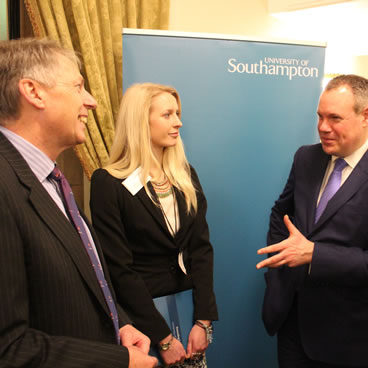
At the UN General Assembly in September, member states formally adopted an ambitious set of sustainable development goals (SDGs) that aim to end poverty, reduce inequality and address climate change. Research across the University is supporting some of these key areas, in particular combating climate change.
Part of the research aims to help governments and policy-makers choose the most effective ways of managing coasts, including dealing with the impact of sea level rise and extreme weather events on coastal and delta communities.
Robert Nicholls, Professor of Coastal Engineering, explains: “The nutrient-rich sediments deposited by rivers when they meet the sea make deltas some of the most fertile environments on the planet. Worldwide, they are home to around 500 million people. However, these low-lying delta environments are particularly vulnerable to a number of factors, including rising global temperatures and sea levels, dam construction upstream and subsidence. Collectively, this puts communities and their livelihoods at risk.”
The £3.7m Ecosystem Services for Poverty Alleviation (ESPA) Deltas project, funded by the Natural Environment Research Council (NERC), the Economic and Social Research Council (ESRC) and the Department for International Development is assessing these risks. Focusing on the densely populated Ganges-Brahmaputra-Meghna delta in Bangladesh, the main output of the study will be a practical tool that will enable policy-makers to test different policy scenarios in the context of climate change and other social and environmental factors. For example, they could see how an increase in fishing subsidies and a decrease in rice farming subsidies might affect income per head in future, or change the way people use the land.
Food security is another priority area, with global food supplies at risk due to the effects of a growing world population coupled with climate change. A deeper understanding of soil and plant processes is becoming increasingly urgent.
“Soil is fundamental to our food supply; 80 per cent of our food comes directly from plants, while meat supplies also rely on plant-based animal feed,” says Tiina Roose, Professor of Biological and Environmental Modelling and a member of the University’s Institute for Life Sciences. “Climate change is set to reduce crop yields by more than 25 per cent from 2050 and traditional fertilisers could run out during this century. However, it is estimated that we need to double food production by 2050 to feed a global population of nine billion.”
Tiina’s interdisciplinary group at Southampton is combining advanced technologies in new ways to determine how crops can be grown more efficiently as resources become scarcer. Through the use of powerful mathematical models, different scenarios can be tested out to determine how plants can be modified or managed to produce the best possible crop yields.
Current projects include a £1.4m initiative to explore how plants manipulate soils to extract more water and nutrients, funded by the Biotechnology and Biological Sciences Research Council (BBSRC) and a €2m award from the European Research Council.


